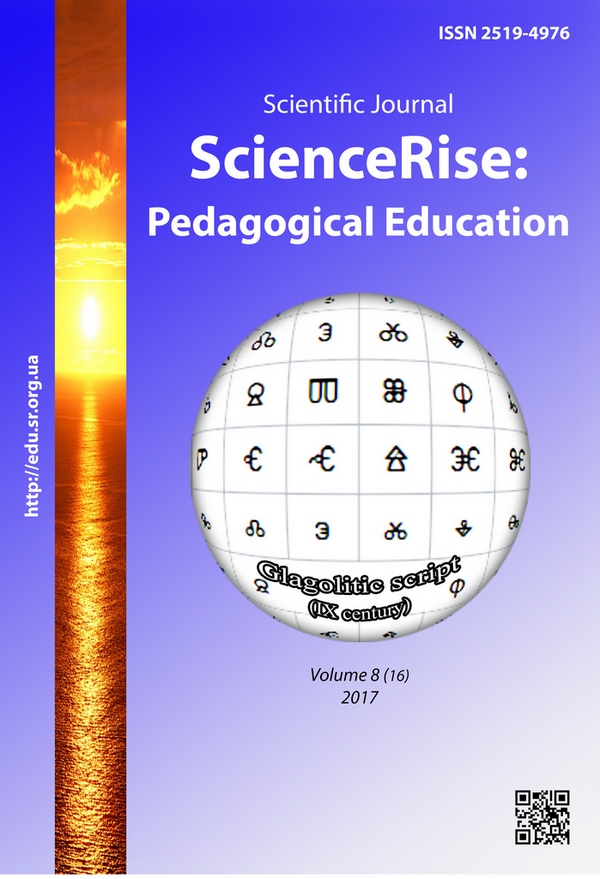Alternative rating system of scientific activity of ukrainian higher educational institutions: methodical bases and results
DOI:
https://doi.org/10.15587/2519-4984.2017.109316Keywords:
HEI, scientific activity, rating, indicative space, integral parameters, cluster analysisAbstract
Higher school conditions the direction of the social development by introducing scientific ideas, developing innovative technologies, studying and promoting effective socio-economic mechanisms of the country development, supports the cultural level, intellect and spirituality of the society. That is why the creation of conditions for strengthening main directions of the higher educational institutions (HEI) activity, especially, their scientific-research, scientific-technical and innovative potential it is a key task of the higher educational system modernization by the Ministry of education and science (MES) of Ukraine. On the background of diverse factors of such motivations, the one of importance is the factor of comparative collations that is the rating base.
The article is devoted to the further development of methodological principles, methodical and information-model support of the construction of the rating system of the assessment of the Ukrainian higher educational institutions potential. The special feature of the offered rating system is the formation of the multi-component system of the quality monitoring of the HEI scientific activity by the four main factors: international activity, scientific activity, citing and commercialization of scientific results. Local indicative systems that allow to assess the HEI scientific activity from system positions were formed for each factor, based on the comparative analysis of the list of parameters of the well-known world ratings and features of the Ukrainian higher system modernization. The pilot calculations of the scientific activity of Kharkiv HEI were realized to probate the offered rating assessment system.
References
- Ponomarenko, V. S., Raievnieva, O. V. (Eds.) (2011). Intehrovana systema «Vyshcha shkola – biznes-struktura»: metodolohiia ta kontseptualni zasady pobudovy. Kharkiv: VD «INZhEK», 160.
- Kalashnik, S. A., Luhovyi, V. I. (Eds.) (2015). Rozvytok systemy zabezpechennia yakosti vyshchoi osvity v Ukraini: informatsiino-analitychnyi ohliad. Kyiv: DP «NVTs «Priorytety», 84.
- Mykhailichenko, M. V. (2011). Kompetentnistnyi pidkhid do pidhotovky kerivnykiv navchalnykh zakladiv. Vytoky pedahohichnoi maisternosti. Ser.: Pedahohichni nauky, 8 (1), 3–8.
- Valenkevych, L. P., Kravchenko, L. S. (2011). Motyvatsiini metody upravlinnia personalom yak chynnyk pidvyshchennia efektyvnosti roboty vyshchoho navchalnoho zakladu (na prykladi SumDU). Visnyk Sumskoho derzhavnoho universytetu. Seriia Ekonomika, 2, 132–136.
- Sanina, O. R., Kushnir, T. M. (2012). Marketynhovi aspekty reitynhovoi otsinky vyshchykh navchalnykh zakladiv na rynku osvitnikh posluh Ukrainy. Visnyk Natsionalnoho universytetu "Lvivska politekhnika", 739, 283–292.
- Dzoba, O. H. (2014). Vykorystannia reitynhovykh protsedur pry formuvanni modeli upravlinnia vyshchym navchalnym zakladom. Ekonomichnyi chasopys - KhKhI. Naukovyi zhurnal, 3-4 (1), 62–64.
- Demidov, Ya. P. (2013). Teoriya i praktika sovremennogo reytingovaniya: kriticheskie zametki. Ekonomicheskiy analiz: teoriya i praktika, 8 (311), 14–19.
- Drach, I. Ye. (2012). Innovatsiino-proektna diialnist u systemi reitynhovoho otsiniuvannia VNZ Ukrainy. Naukovyi visnyk NHU. Seriya: Ekonomika ta upravlinnia, 5, 126–131.
- Sherega, F. E., Arefyev, A. L. (Eds.) (2014). Rating THE of higher education institutions of BRIKS countries and countries with rising economy. Digest. Measurement of universities ratings: an international and Russian experience. Ministry of the Russian Federation education and sciences. Moscow.
- Hazelkorn, E. (2015). Rankings and the Reshaping of Higher Education: The Battle for World-Class Excellence. Palgrave Macmillan UK, 304. doi: 10.1057/9781137446671
- Razrabotka i aprobaciya metodologii reytingovaniya obrazovatel'nyh uchrezhdeniy professional'nogo obrazovaniya. Available at: http://ranking.ntf.ru/
- Reytingovanie universitetov (2013). Otechestvennye zapiski, 4 (55). Available at: http://strana-oz.ru/2013/4/reytingovanie-universitetov
- Van Raan, A. F. J. (2005). Fatal attraction: Conceptual and methodological problems in the ranking of universities by bibliometric methods. Scientometrics, 62 (1), 133–143. doi: 10.1007/s11192-005-0008-6
- Ioannidis, J. P., Patsopoulos, N. A., Kavvoura, F. K., Tatsioni, A., Evangelou, E., Kouri, I. et. al. (2007). International ranking systems for universities and institutions: a critical appraisal. BMC Medicine, 5 (1). doi: 10.1186/1741-7015-5-30
- Billaut, J.-C., Bouyssou, D., Vincke, P. (2009). Should you believe in the Shanghai ranking? Scientometrics, 84 (1), 237–263. doi: 10.1007/s11192-009-0115-x
- Waltman, L., Calero-Medina, C., Kosten, J., Noyons, E. C. M., Tijssen, R. J. W., van Eck, N. J. et. al. (2012). The Leiden ranking 2011/2012: Data collection, indicators, and interpretation. Journal of the American Society for Information Science and Technology, 63 (12), 2419–2432. doi: 10.1002/asi.22708
- Veljko, J., Marković, A., Bulajić, M.; Jakšić, M. L., Rakočević, S. B. (Eds.) (2012). A Critical Assessment of International University Ranking System. Proceedings of the XIII International Symposium SymOrg 2012: Innovative Management and Business Performance, 554–559.
- Paruolo, P., Saisana, M., Saltelli, A. (2012). Ratings and rankings: voodoo or science? Journal of the Royal Statistical Society: Series A (Statistics in Society), 176 (3), 609–634. doi: 10.1111/j.1467-985x.2012.01059.x
- Billaut, J.-C., Bouyssou, D., Vincke, P. (2009). Should you believe in the Shanghai ranking? Scientometrics, 84 (1), 237–263. doi: 10.1007/s11192-009-0115-x
- Ward, J. H. (1963). Hierarchical Grouping to Optimize an Objective Function. Journal of the American Statistical Association, 58 (301), 236–244. doi: 10.1080/01621459.1963.10500845
- Plyuta, V. (1989). Sravnitel'nyy mnogomernyy analiz v ekonometricheskom modelirovanii. Moscow: Finansy i statistika, 173.
Downloads
Published
How to Cite
Issue
Section
License
Copyright (c) 2017 Olena Rayevnyeva, Svitlana Stepurina

This work is licensed under a Creative Commons Attribution 4.0 International License.
Our journal abides by the Creative Commons CC BY copyright rights and permissions for open access journals.
Authors, who are published in this journal, agree to the following conditions:
1. The authors reserve the right to authorship of the work and pass the first publication right of this work to the journal under the terms of a Creative Commons CC BY, which allows others to freely distribute the published research with the obligatory reference to the authors of the original work and the first publication of the work in this journal.
2. The authors have the right to conclude separate supplement agreements that relate to non-exclusive work distribution in the form in which it has been published by the journal (for example, to upload the work to the online storage of the journal or publish it as part of a monograph), provided that the reference to the first publication of the work in this journal is included.








